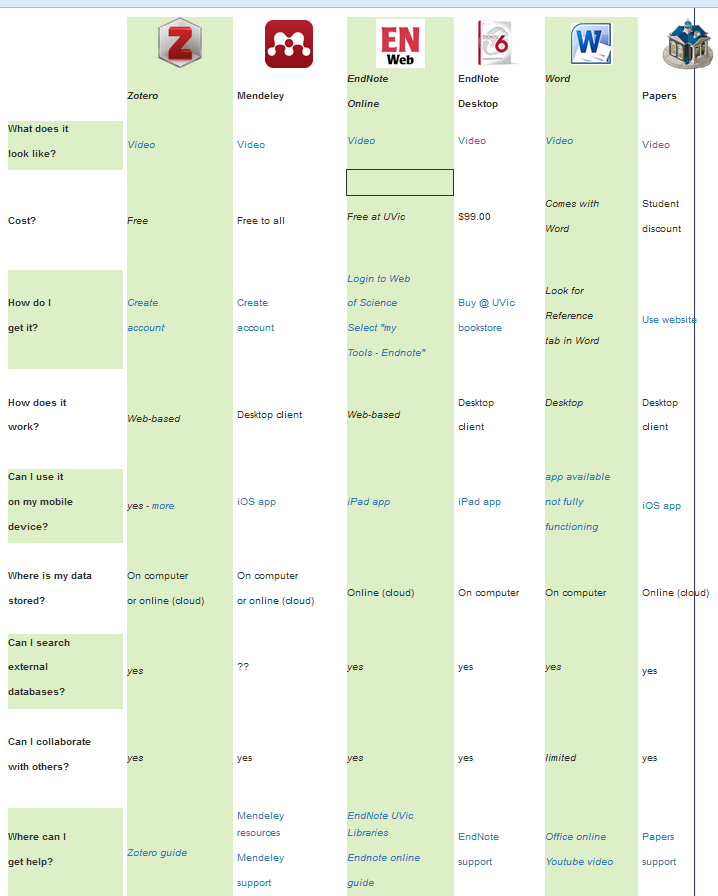By Madeline Walker
Are your notes on sources scattered everywhere? Do you write with the intention of citing later, but then forget where you found that bit of information? Choosing and using reference management software early in your graduate program will get your reading and research off to an organized, efficient start. Academic and blogger Pat Thomson calls her chosen reference management tool, Endnote, her “adjunct brain” (2016, p. 49). Over many years, she has stored almost 10,000 items on Endnote, creating a searchable database of sources (Thomson & Kamler, 2016, p. 49). You too can let a reference manager do some of your work for you. Reference managers can keep track of articles and books by importing bibliographic information directly (or indirectly) from the source, picking up metadata from pdfs, formatting citations in your chosen style, building bibliographies, and searching/sharing data. There are many managers to choose from—all with different features. Our library has put together a page about reference managers with descriptions of each one and a comparison chart of six popular products. If you want to compare a wider range of reference managers, check out Wikipedia’s comprehensive comparison chart of 32 products.

Three of the most popular reference managers are Endnote, Mendeley, and Zotero. Each tool has benefits and disadvantages, so you may want to test drive the free products before deciding on one. Functionality, aesthetics, the requirements of your discipline, and just plain personal preference will come into play. Consider what your fellow students/researchers are using in case you want to share citations or folders for group projects. One caution: the web-based versions store data in the United States so are not recommended for storing any personal or confidential data. You may wish to consider a product you can download on your computer.
I asked three of our reference librarians to say a little about the product they’re most familiar with. However, please note that neither the library nor its librarians recommend or endorse a particular product. Here’s what they said:
Aditi Gupta on Endnote:
Endnote can be purchased as a standalone software program (EndNote X8) that works well with MS Word, Open Office, and other tools OR students can use a free Endnote basic version. You will need to create a free account to access Endnote basic online. It easily allows you to import references from databases and create a list of references using different citation styles including APA, MLA, and Chicago. Once you have started to import your references, you can share your folders with other Endnote users.
Rebecca Raworth on Mendeley:
“Your research content is primarily contained in PDF files: Mendeley has an integrated PDF viewer and can create citation records just from importing a PDF file. Mendeley.org has the strongest website and community platform.” (from http://libguides.wustl.edu/choose). Also, Mendeley (free version) is very good for collaborative work, and if you back up records, you can sync multiple computers. Mendeley also provides 2GB of web space.
Michael Lines on Zotero:
Zotero works best on a PC running Firefox. If you already use that combo, or can make the switch, it can really improve your workflow. Because it lives in your browser, it facilitates collecting and checking citations as you do your research. Getting that piece into your routine saves a ton of headaches. It is also an open-source program made at a US university for academic purposes, so it is strong ethically. It has an online component that can be fun, useful, and collaborative, but it is based on US servers, so it opens you up to NSA inspection. And remember that choosing a citation manager should be part of a larger practical review of your research and reading process!
If you are reluctant to start using a reference manager because you find technology challenging, links provided in the library’s comparison chart take you to helpful videos and user-friendly documentation.
Students can consult about citation management and other research-related issues with librarians via email and text, and also in-person at the Research Help desk on the main floor of the library.
Best wishes for a productive and joyful semester.
Reference
Thomson, P. & Kamler, B. (2016). Detox your writing: Strategies for doctoral researchers. London, UK: Routledge.